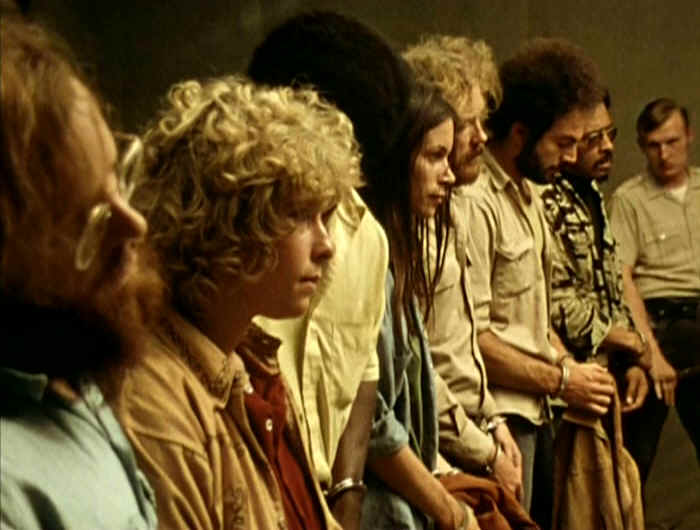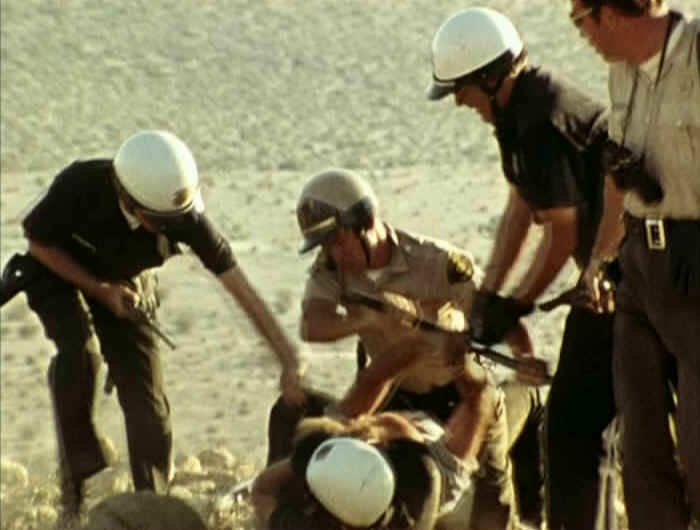Punishment Park
by
Peter Watkins 1971

PUNISHMENT PARK
|
Punishment Park |
 |
Starring Jim Bohan, Van
Daniels, Frederic Franklyn, Sanford Golden, Harlan Green, Rodger Greene
Director(s) Peter Watkins
Screenwriter(s) Peter Watkins
Studio Sherpix, Chartwell, Francoise
Production Company Francoise Films
Genre: Drama
Running Time: 88 minutes
Country: U.S.
Media Type: Color
CAST CREW
Jim Bohan - Captain, Sheriff's Dept. Van Daniels - County Sheriff Frederic Franklyn - Prof. Daly Sanford Golden - Sen. Harris Harlan Green - Sheriff Rodger Greene - Federal Marshal Joe Hudgins - Chief Tribunal Marshal Mark Keats - Chairman Hoeger Lee Marks - FBI Agent Donovan Sigmund Rich - Prof. Hazlett Paul Alelyanes - Policeman Kerry Cannon - Policeman Bob Franklin - Policeman Carmen Argenziano - Jay Kaufman Stan Armsted - Charles Robbins Harold Beaulieu - Desert Militant Cynthia Jenkins - Desert Militant Jack London - Desert Militant Rob Lewine - Desert Militant Roland Gonzalez - Desert Semi-Militant Jack Gozdick - Desert Semi-Militant Brian Hart - Desert Semi-Militant Linda Mandel - Desert Semi-Militant Don Pino - Desert Semi-Militant Jason Summers - Desert Semi-Militant Conchita Thornston - Desert Semi-Militant Danny Conlon - National Guardsman Sandy Cox - Stenographer Gladys Golden - Mrs. Jergens George Gregory - Mr. Keagan Mitchell Harding - Newscaster Mike Hodel - Newscaster Gary Johnson - Desert Pacifist Michele Johnson - Desert Pacifist Ted Martin - Desert Pacifist Harold Schneider - Desert Pacifist Luke Johnson - Luke Valerio Tom Kemp - Tribunal Marshal Mary Ellen Kleinhall - Allison Mitchner Katherine Quittner - Nancy Smith Patrick Boland - Defendant Scott Turner - Janus Kohler Peter Watkins - Documentarist |
|
Other movies by Peter Watkins:
Edvard Munch (1976)
... Director ; Writer
Punishment Park (1971) ... Documentarist ; Director ; Editing ; Writer
Gladiators, The (1970) ... Director ; Writer
Privilege (1967) ... Director ; Writer
It Happened Here (1966) ...
_________________________________________________________________________________
This movie could scarcely have been more timely. Punishment Park feels less
like something that was made thirty years ago in our world, and more like something
that leaked in sideways from an alternate universe gone horribly wrong. I doubt
anyone in 1971 would have imagined that Punishment Park would still have relevance
in 2003, but it does, and that fact alone is both exciting and ghastly.
In the late Sixties and early Seventies there was a small but thriving subgenre
of movies that entertained alternate histories for the era. One of the most
well-known (and most fun) was Wild in the Streets, which showed the Peace 'n
Love generation coming to power and being just as thuggish and cretinous as
the over-30 crowd they professed to hate. Another, all but lost to history,
was Robert Kramer's little-seen Ice, a story of urban revolutionaries fighting
back against repression in New York City (!). Punishment Park has similarities
to Ice, but is far more immediate and engaging.
The movie posits a simple and horribly credible scenario: During the later years
of the Vietnam War, hundreds of people are being arrested and kangaroo-courted
in the United States for "inciting political unrest." They have two
choices: lengthy prison sentences, or three days in Punishment Park, a stretch
of California desert somewhere near Los Angeles. In Punishment Park, the prisoners
are set free and forced to navigate a hostile stretch of burning terrain --
if they can reach the American flag at the end of the course within the allotted
time, they are set free. Of course, they have more than the elements to contend
with: Punishment Park is also used as a proving ground by police officers in
training. If they get caught, they go to prison. "These officers have strict
instructions not to molest you in any way," the controlling officer declares,
and from the way he underscores those words verbally, we suspect there is going
to be at least one blatant violation of that rule. We are right.
 |
 |
A new group of prisoners is given the option to go to Punishment Park.
I found it unlikely that any American director would have dared to film this
material, and I was right: Punishment Park was created by British documentarian
Peter Watkins. Watkins also directed the controversial and horrific War Game,
a BBC-funded pseudo-documentary that wound up never being aired on the very
network that funded it. Instead, it was released to theaters and later to TV
and home video, and has become something of an underground classic in anti-war
circles. It deserves a broader audience, especially in today's increasingly
unsettled political climate.
The film cuts between two groups of people: one gang of prisoners who are just
now being run through the farce of the tribunal, and another who are just now
entering Punishment Park. The movie is not truly interested in any of them as
individuals, but in a film like this, having individuals who stand out from
the whole canvas would actually be a deficit. The point is not to create heroes
and prop them up, but to depict a broad swath of possibilities. Every now and
then, faces do swim out from the canvas: the balding, fat-necked tribunal master,
or the angry black militant who speaks his piece of mind in court. The cops
also get some camera time. "This was their choice," one of them says,
referring to the Punishment Parkers. "They could have chosen to do a lot
of things, but they chose instead to throw bombs and advocate the overthrow
of the government. They're doing what they want to do, and I'm doing what I
want to do."
 |
 |
The police are close behind as the runners slog their way through the desert.
One of the more interesting things Watkins does with the tribunal is populate
it with a broad spectrum of the people that made up the "Silent Majority"
in America. At one point we get a credit caption: Professor, Department of Sociology,
University of Glendale. What's he doing here? The same thing as everyone else,
evidently: getting his two cents in, and he does. There's another revealing
moment where one of the runners (who bears a striking resemblance to Roger Daltrey)
says, "They believe in protest and ritual defiance, and yet they participate
fully in the rules for these games, and expect they'll come out the other end
with the flag." When asked how things could be changed, he says, wisely,
"I don't think anything can be done. I think we just got to evolve out
of it." Sometimes even the tribunal members make sense, and I think that
is exactly what Watkins wanted -- he's not here to side with either party, but
to show the whole.
Watkins shoots the movie with a loose, fluidly improvisational camera style,
and his editing juxtaposes sequences with biting intelligence. The parallels
between this film and Battle Royale are obvious, although the two movies use
markedly different approaches. Battle Royale was calculated melodrama -- searing
social satire wrapped in the guise of an action movie. Punishment Park is very
much an heir to Watkins' own War Game in its style and its detached, flat-affect
feel. But Park and Battle Royale have something else in common, something subtle
enough that it didn't come to me right away. In Battle Royale, the game was
purposefully ludicrous: if it made sense, then the movie could be seen as investing
it with credence it did not deserve. Punishment Park works the same way. The
more we see of the park itself, the more we realize how it doesn't even work
as a gladiatorial exercise -- it's a sham through and through.
 |
 |
The ultimate irony: they may not even be allowed to win.
Punishment Park was described as being "banned in the United States,"
but it is probably closer to the truth to say that it has simply never been
shown here commercially. It premiered at Cannes to highly polarized opinions;
the New York Times wrote (in a review that feels like Peter Sotos come 30 years
early), "[it is] a movie of such blunt-wrong headed sincerity that you're
likely to sit through the first 10 hysterical minutes of it before realizing
that it is essentially the wish-fulfilling dream of a masochist. Because all
literature, including futuristic nonsense like this, represents someone's wish-fufilling
dream, I can't help but suspect that Wakins' cautionary fable is a wildly sincere
desire to find his own ultimate punishment." The near-incoherence of this
aside, I have to wonder why they were so eager to read in some hidden motive
on Wakins' part for making it. Rolling Stone voted it one of the ten best films
of 1971, while Playboy groused, "Seldom has the cause of peace and freedom
been served so mindlessly" -- which assumed, incorrectly, that the movie
was a knee-jerk vindication of the left.
Seeing Punishment Park released to video makes me wonder how many of Watkins'
other, little-seen movies will come to the surface. Aside from The War Game,
he has also made Privilege, an openly fictional movie about a future world church
/ government using pop music to control the masses -- another idea that today,
like Punishment Park, seems to have undimmed relevance.
_________________________________________________________________________________